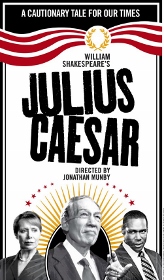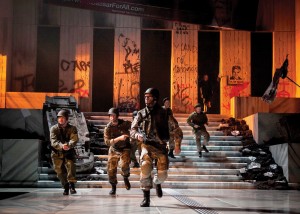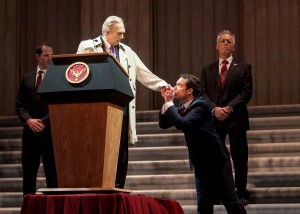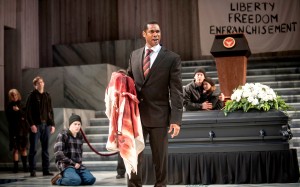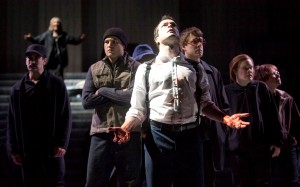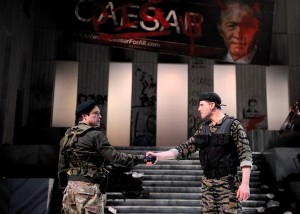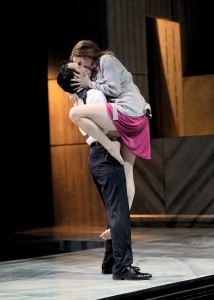YOU HAVE NO CHOICE BUT TO
LEND THIS PRODUCTION YOUR EARS
Brutal and relentless, Julius Caesar chronicles a fateful course of envy and revenge defeating idealism and loyalty: Brutus and Cassius, the principal murderers of the titular dictator, are dogged to death by his avengers Marc Antony and Octavius Caesar. But the republic the assassinators killed for is destroyed by their so-called “virtuous” slaying.
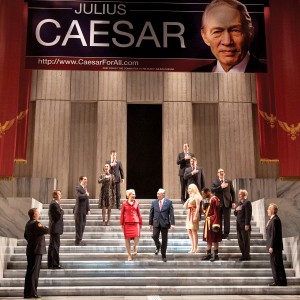 It’s not surprising that Shakespeare’s most political play should center on an assassination, the ultimate act of censorship. No hymn to democracy, Julius Caesar (or rather, Shakespeare) condemns both the death of the title tyrant and the fickle loyalties of the mob who applaud his murderers. However “honorable” seem the chief conspirators Brutus and Cassius, they invite doom by daring to substitute their narrow and self-serving vision of Rome’s well-being for Caesar’s benevolent concept of a greater good. Inevitably, once they achieve power by default, they dissolve into petty squabbles; other than survival, there’s no grand vision to hold them fast. The Battle of Philippi, where Octavius and Mark Antony destroy the assassins, only completes the damage inflicted by disunity.
It’s not surprising that Shakespeare’s most political play should center on an assassination, the ultimate act of censorship. No hymn to democracy, Julius Caesar (or rather, Shakespeare) condemns both the death of the title tyrant and the fickle loyalties of the mob who applaud his murderers. However “honorable” seem the chief conspirators Brutus and Cassius, they invite doom by daring to substitute their narrow and self-serving vision of Rome’s well-being for Caesar’s benevolent concept of a greater good. Inevitably, once they achieve power by default, they dissolve into petty squabbles; other than survival, there’s no grand vision to hold them fast. The Battle of Philippi, where Octavius and Mark Antony destroy the assassins, only completes the damage inflicted by disunity.
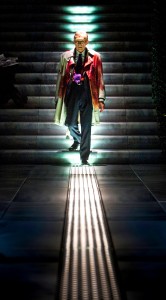 Properly produced, the play feeds on its energy like a firestorm, propelled by a seemingly unstoppable and inevitable chain of events. The only doubt: whether model-citizen Brutus will join a conspiracy whose murderous intent undermines not only his principles but his loyalty to Caesar. After that, we simply await the reckoning of battle.
Properly produced, the play feeds on its energy like a firestorm, propelled by a seemingly unstoppable and inevitable chain of events. The only doubt: whether model-citizen Brutus will join a conspiracy whose murderous intent undermines not only his principles but his loyalty to Caesar. After that, we simply await the reckoning of battle.
Going beyond the minimum requirements of a history play – that it be workmanlike, straight-forward, and presentable – this Chicago-debut staging at Chicago Shakespeare by British director Jonathan Munby is spectacularly cinematic, rampaging across, over and around Alexander Dodge’s sprawling marble set, which in the play’s course evolves from totalitarian sterility to a war-ravaged Damascus circa 2013, with graffiti, a defaced campaign banner, an overturned car, and hordes of soldiers and civilians shooting wildly or fleeing in fear.
This painfully contemporary Julius Caesar needs and receives all the urgency it can muster. It opens, circus-like, with a two-stepping square dance performed by cute college kids, depicting Caesar’s fans as much as fanatics, taping the fun for You Tube, and passing out campaign literature for his re-election. Munby continues the modern touch with CNN-style press conferences, a terrific storm worthy of global warming, and a closed circuit T.V. depiction of the assassination. (Curiously and regrettably, the title character’s actual political murder seems like a private affair, with Caesar’s ubiquitous bodyguards suddenly disappearing and only the seven conspiratorial senators on hand to stab at least ten blood bags as well as Caesar. You get no sense of the horror registered by the onlookers – and that’s worth seeing.)
Munby says, “This play opens up so many of the fears that the populace has in this moment of history – the fear of losing democracy, of losing a voice, of what lies ahead.” Indeed, Munby exposes it all. The panic is obvious in the cluelessness of conspirators who clearly have no plans for what comes after Caesar. All but John Light’s dynamic Brutus hate Caesar, not for the harm he’s done but the power he has or seeks. But merely preserving the Roman Republic’s status quo after such a schism would be impossible. Typical of this nest of vipers, Jason Kolotouros’ splenetic Cassius is all ego and no mind as he lurches from one bad choice to the next. Larry Yando has a sly turn as the cynical and imperious Casca.
In contrast, David Darlow’s magisterial, statue-like Caesar is infuriatingly unflappable as he receives urgent warnings from a soothsayer, a crazy street lady, and his anguished wife Calpurnia (Barbara E. Roberston) about the Ides of March which he perversely refuses to beware.
The Triumvirate who, like Caesar’s ghost, pursue the plotters to their suicidal graves at Philippi are ineffectual Lepidus (David Lively), the future first-emperor Octavius Caesar (a sociopathic Samuel Taylor), and, of course, the magnificent rabble rouser Marc Antony. Dion Johnstone makes the speechmaker a force of nature as he subtly turns Caesar’s populist foes into sudden converts, looting, ravaging and screaming to the rafters.
Because Shakespeare admirably but sometimes maddeningly proves even-handed as he portrays the bad and good on both sides, it’s hard to get close enough to any character to care for their victory. Inevitably, despite its title, the play – and certainly this revival – is about the citizens of Rome, fickle, foolish and ultimately no better off no matter who wins.
Here it’s also about the special effects: The sounds of battle (from Lindsay Jones) are just the ear-splitting sonic overkill you’d expect in today’s Middle East rebellions or the hills of Afghanistan; Philip S. Rosenberg’s lighting amounts to bravura pyrotechnics seemingly out of control; and Matt Hawkins completes the job with fight choreography that may compel you to make a citizen’s arrest. While all of the technological sound and fury signifies nothing, what we hear underneath means much, and we should all lend an ear.
Julius Caesar
Chicago Shakespeare Theater
Courtyard Theater on Navy Pier
800 E. Grand Ave.
ends on March 24, 2013
for tickets, call 312.595.5600
or visit Chicago Shakes
for more shows, visit Theatre in Chicago
